Credit Suisse’s hefty ‘tuna bonds’ bill warns banks of regulators’ long reach
20 October 2021 13:25 by Martin Coyle

Credit Suisse’s thumping hit for serious financial-crime failings warns banks of the risks in doing business in parts of the world dogged by corruption. The penalty also illustrates the long reach that US prosecutors have, even without using the country’s foreign bribery laws.
The Swiss lender was told yesterday to pay a total of $475 million to US and UK authorities to settle long-running investigations over its ill-fated foray into the Republic of Mozambique between 2012 and 2016, in what was dubbed the "tuna bonds" scandal.
The global settlement centers on about $2 billion worth of loans issued by Credit Suisse and Russian bank VTB PJSC from 2013 onward to help the African state’s fishing industry. As part of that arrangement, around $200 million was siphoned off and went either to corrupt officials, or to bankers involved in the deal.
As part of the settlement, Credit Suisse has also agreed to forgive $200 million in debt owed by Mozambique and to pay an amount of restitution to investors to be determined later. VTB was fined $6.4 million by US regulators.
Three former Credit Suisse bankers pleaded guilty in 2019 in federal court in New York to related wrongdoing: former managing directors Andrew Pearse and Surjan Singh, and a former vice-president, Detelina Subeva. They haven't yet been sentenced.
Both the UK’s Financial Conduct Authority and Swiss Financial Market Supervisory Authority pointed to serious shortcomings at the lender and a poor culture at the bank. The FCA said it failed to prioritize the fighting of corruption risks in its emerging-markets division.
“Time and again there was insufficient challenge within Credit Suisse, or scrutiny and inquiry in the face of important risk factors and warnings,” the FCA said. Senior executives in bank control functions were told of the serious risks of bribery in Mozambique, but these warnings were seemingly ignored.
The bank also failed to take notice of a report warning of the involvement of a contractor known as “a master of the kickbacks,” who secretly paid more than $50 million in bribes to members of Credit Suisse’s deal team to secure favorable loan terms, the regulator said.
Credit Suisse failed to properly resource its financial crime team to deal with the complexity of work associated with Mozambique, and it didn’t take a “holistic assessment” of the financial risks, the FCA said.
This theme was echoed by the Swiss regulator, which found "serious breaches" of Swiss law and glaring failings at the bank's highest levels, notably in the handling of the fallout from the scandal between 2016 and 2019, when it began looking at individuals connected.
“The observations and, in particular, the way in which they were conducted, kept secret and partly concealed are evidence of an inappropriate corporate culture among parts of Credit Suisse’s operational management at that time,” it noted, and board members used personal communications channels that couldn't be traced.
Long reach
While Credit Suisse still faces a civil trial in London in 2023 brought by creditors over the case, it said it was pleased to draw a line under the regulatory issues.
For other financial institutions, meanwhile, there will be takeaways in the scale and reach of the foreign authorities involved.
The Swiss bank's failures led to it being sanctioned not just in Switzerland but in the UK and the US, far from its Zurich headquarters, and even farther from the African bribery scheme itself.
The involvement of the UK's FCA is readily explained by the Mozambique dealings going through the bank's London unit, which was formally under the UK regulator's supervision.
But the involvement of US prosecutors is a different matter, and shows a key risk for banks' overseas dealings.
US financial crime prosecutors illustrated ingenuity by crafting a legal theory that avoided charges under the country's law against international bribery, the Foreign Corrupt Practices Act, even though this itself has extra-territorial reach under certain circumstances.
Instead, they used the adaptable wire fraud statute as the basis for their action, under a theory that investors in the US were harmed when they weren’t informed about the corruption pervading the loan deal.
That theory allowed prosecutors to duck one limitation of the FCPA: the wrongdoer, under that law, needs at least some connection to the US. That can be a US-based subsidiary, the involvement of a US-based employee or agent, or trading of company stock on a US exchange.
An investor-harm theory like the one employed in the Credit Suisse case, conversely, allows for a case to be brought simply because a US investor wasn’t fully informed.
While creative use of the FCPA has allowed for cases involving companies with little connection to the US, the investor-harm theory could permit US prosecutors to police even more far-flung cases.
Related Articles
No results found
